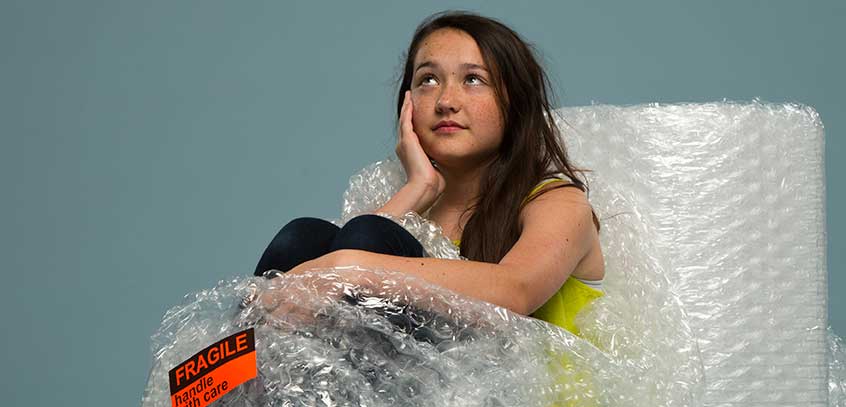Are you a hovering helicopter parent who micromanages their offspring’s activities, or are you a hands-off enabler who allows their tween or teen to self-direct? Or, do you reside somewhere in between?
By Karyn Brodsky | Staff Writer
Parenting styles can differ greatly and so can boundaries. We’re digging deep in this feature story to find out just how far parents will go to influence their children.
Driven to Protect Them Behind the Wheel
 Your teen gets a driver’s license and – spoiler alert – life as you know it has changed forever (and you thought having kids was the biggest life-changer you’d experience). From now on, you’ll pace nervously until the text confirmation of her arrival (while parked, of course). And you’ll never fall asleep until you hear the garage door open to signify her safe return. But how can you know for sure your young driver is making the right choices and staying safe?
Your teen gets a driver’s license and – spoiler alert – life as you know it has changed forever (and you thought having kids was the biggest life-changer you’d experience). From now on, you’ll pace nervously until the text confirmation of her arrival (while parked, of course). And you’ll never fall asleep until you hear the garage door open to signify her safe return. But how can you know for sure your young driver is making the right choices and staying safe?
Technology is now your best friend. Auto insurance providers offer devices to monitor and report the car’s rate of speed when your teen drives. Some automobile ignitions will deactivate if the driver has alcohol on his breath, and smart phones make tracking available. Dallas dad Jay Bell depends on tracking APPs to “find” his child…or at least his mobile phone. Bell, whose son will get his license this summer, feels more secure about letting him drive if he can monitor his whereabouts. “I know if my son forgets to text me when he arrives at his destination, I can track his phone to see if he’s where he’s supposed to be.” Alicia Wanek of Plano agrees and is planning ahead. “My teens are not driving yet, but my husband has already looked into tracking devices and to see if there are ways to disable texting while the car is moving.”
A Dallas mom (who chooses to remain anonymous), says it depends on maturity. “I would not put a tracking device on them,” says the mom of two teens. “They know they have to keep in touch. They’re good kids who talk to us a lot, and I’ve never had to worry about them. [My husband and I] laid a lot of groundwork in the early years and never felt the need to snoop.”
Jane Ito of Richardson uses a low-tech approach (plus a tracking APP) that seems to be working. She drafted a 13-point contract for her 16-year-old son to sign that outlines rules by which he must abide, or he will lose his driving privilege. “It’s useful to put things in writing because my son, like other teens, doesn’t always listen to words.” Ito reminds her son that his life, the lives of his passengers and the lives of other drivers on the road are at stake.
Bell plans to craft a driving contract for his son as well. “It tells him what I expect in clear terms, and if he doesn’t adhere to the rules, he has to face the consequences.” Bell will also tie school performance to driving. “If he doesn’t put in the effort and get the grades expected of him during a grading period, then his car will sit in the driveway [and not be driven by him] until the next set of grades come out.”
Whatever your choice, remember the State of Texas has strict laws for teen drivers, and at minimum, your child must follow them. Teens are required to get 30 hours of behind-the-wheel driver training practice to become eligible to graduate from a driving permit to a provisional driver’s license. All teen drivers must adhere to Graduated Driver License (GDL) restrictions until age 18, including: for the first 12 months, a provisional license holder under the age of 18 may not drive with more than 1 person under the age of 21 that is not an immediate family member; teen drivers may not drive between the hours of midnight and 5:00 AM except for medical emergencies, purposes of employment or a school sanctioned activity; after 6 months, both the passenger and time restrictions are waived. (drivinglaws.org/teen/texteen.php)
The “Dating Game”: What’s Acceptable & What’s Not

Your 14-year-old son announces he has a girlfriend. Your 15-year-old daughter says the cute boy in English class asked her for a date. So what do you say? Current dating practices are very different than when we grew up and certainly a far cry from those of earlier generations. In the 1950’s, one well-known premise of dating etiquette for girls was to “properly introduce your date to your parents”. Dating etiquette for boys warned “not to kiss on the first date”. If only it were that simple today!
First, how young is too young? Jay Leshefsky of Plano says his 13-year-old daughter hasn’t started dating yet. “[That] would seem to be too young.” And where should teens be allowed to spend time together? “When [my daughter does date] they can hang out in the house,” Leshefsky adds. “Not in the bedroom and not in a room with the doors closed.” Aubrey dad Shawn Saumell notes, “Our teens are not allowed to date yet. We have an open dialog about dating and discuss what the goal or point in dating is.” He adds that he and his wife prefer the teens stay in common areas as much as possible.
Many of today’s teenagers go out in groups as opposed to one-on-one dating, and this brings some degree of comfort to parents. Plano mom Julie Sacks admits, “Dating is new to us. My older daughter has her first boyfriend right now, so we are making the rules up as we go along.” She adds that her daughter and her boyfriend participate in many group get-togethers or spend time at her home. “I do prefer the kids to be here,” says Sacks. “I feel if they are here, I have a better idea of what is going on.”
Dallas dad and family lawyer Jeff Anderson says he expects his 14-year-old son and his girlfriend to remain downstairs on the main floor when she is over. “I talk regularly to his girlfriend’s guardian about our rules, and I’ve had very direct talks with my son about what is expected of him.”
Being accountable while visiting other teens is important, too. When Plano mom Lisa Kivett’s teenage son goes out “we have always required that we know at whose house he is and whether there were parents at home.”
Do You Troll Texts and Stalk Social Media?

This is a controversial issue that pits protection against snooping. There are those like Plano Sergeant Courtney Pero who think that when it comes to kids and their safety, privacy should be a minor consideration. Pero advises parents to monitor teens’ electronics use and keep electronics out of the bedroom. “Parents should be privy to all access codes and passwords.”
Kivett agrees and reserves the right to look at her teens’ phones and to know their current passwords, or they will lose their device privileges. She explains her approach is not to be a helicopter mom but to be one who “provides copious amounts of information about dangers and limitations”. As part of warning her teen of the pitfalls of social media, Kivett told him that nothing is ever truly deleted and that texts, emails or social media posts could be shared or end up in the wrong hands. Worse yet, it could hurt someone. Kivett told her son to use this rule of thumb: “If you don’t want Grandma to see it, don’t post it.”
Principal William McLaughlin of Shepton High School in Plano warns of the dangers of social media and refers to a quote by Devin Padavil, first vice president of the Texas Association of Secondary School Principals, as reported in the Dallas Morning News. McLaughlin says Padavil called social media “the largest unsupervised playground in the world”.
McLaughlin agrees with Padavil. “With social media, you’re giving your kids keys to the world and the world keys to their life.” As he does in his own home, McLaughlin suggests parents require accountability with the right to check social media and texts at any time. The bottom line, he says, is that “the phone is owned and the bills are paid by the parents.” He recommends teaching digital citizenship to kids so they can create a positive digital profile for colleges and employers. “Use this as a teachable moment. There’s a happy medium between stalking your kid and giving your kid unfettered access to social media.”
There are some parents who fight fire with fire by using technology to monitor technology. Device monitoring APPs such as Qustodio alert parents to inappropriate posts and filters adult content. Anderson has checked his kids’ texts before but doesn’t do so now and hopes that openness and honesty prevail. “There are so many different text programs, it’s impossible to check them if a child wants them hidden.” Anderson is friends with his children on Facebook, and he talks with them openly about social media and its dangers.
At the other end of the spectrum, Dallas anesthesiologist Dr. Katie Blakeley checks texts and emails only occasionally because she doesn’t want to erode trust. She admires her brother’s open policy about reading ALL texts and emails of his teens. “[It just] seems a lot more honest and up front,” Blakeley says.
Helper or Handler: The Quest for an “A”

When it comes to tweens and teens excelling in class, there are three basic schools of thought: help your children get an “A” no matter what it takes, even if it means giving them the answer (admit it, we’ve all done that at least once); provide guidance and answer questions, but never actually do the work for them (in a perfect world); let them sink or swim (often times the result of parental frustration) to learn a hard lesson. None of these techniques is foolproof and many parents employ a little bit of each.
Sumitra Reddy of Plano favors the first camp and says when it comes to doing too much to help your kids excel in school, “[My] personal opinion is there is NO [such thing as] too much. [Pushing them] is okay and the [banning of] smart phones and the PS4 make it easy to reprimand.”
Kivett’s philosophy falls within the boundaries of the second camp, yet she worries that she has probably been far more the secretary and task master than she’d like to be. When her kids were younger, she monitored grades on line, checked homework and made sure her kids marked their agendas. “I pushed them where they wouldn’t push themselves, and then we’d discuss afterwards how good the effort was to be able to have learned enough and earned an A grade.” Once her eldest was in high school the effort was up to him, with participation on sports teams and part time jobs dependent on achieving good grades. “His success has had to be his own,” explains Kivett, “It would have been easier to do it for him, but he wouldn’t have learned important life lessons that should now help him in college.”
Saumell agrees. “I don’t do any of my teens’ work, but I do monitor grades and hold them accountable and responsible for their own work.” He stays in communication with teachers to ensure that his kids are being responsible and will tutor the kids at home. He won’t provide them with answers but will offer tools and resources to help them help themselves.
In the third camp, Blakeley says she has never done homework or projects for any of her four kids who are now all in high school or older. Other than working with her teens as a team to reword writing assignments, she says, “My mantra is ‘I already went to __ grade. I do not need to do it again.’” Blakeley feels strongly that her kids need to do the hard work, and they will not learn if she does it for them. She believes they need to learn to fail too and would rather have them fail while under her roof than later in college. Blakeley adds, “I do not want to promote lying or cheating. I consider turning in homework that someone else did to be both lying and cheating.”
College Coach or Application Commander?

Ann Landers once said, “It is not what you do for your children, but what you have taught them to do for themselves, that will make them successful human beings.” McLaughlin agrees. “I think, in a society of being helicopter parents, we’ve deprived our kids in learning life lessons. The kids would have been better served learning on their own,” he says.
Dallas mom Julie Shrell took this approach when her twin daughters (who recently graduated from college) were going through the application process. She provided instructions about deadlines, met with their counselors and was there if they needed help or a gentle reminder. “I didn’t have to worry about them,” notes Shrell. “They really wanted to go to college, and they were self-starters.” Shrell warns though, that the amount of assistance or prodding depends on the individual child.
Kivett and her husband sat down with her son in his freshman year of high school and read about application requirements to prepare him. “He knew specifically what it would take to get into different colleges, he learned the costs, he learned what he’d need for scholarships and he learned his options in high school to get there.”
Shrell isn’t opposed to letting her younger son take a gap year before college and would have been open to it for the twins, though they didn’t ask for one. Once at school, Shrell says her girls knew what she and her husband expected of them to be on the “college payroll”. “They knew if they didn’t make the grade or take a full load, they were coming home.” Shrell emphasizes that she wanted to make her teens accountable. “It is important for me that [my kids] be a part of it,” Shrell explains. “It’s their college. I already went.”
Varun Tewari, CEO & Founder of Victory Step Test Prep, an educational company with locations in Dallas and Plano, prepares teens for the ACT and SAT tests. He feels that parents need to find a balance between being demanding and overbearing versus being too distant. “[The] college selection process is a complex one, and parents are usually in the best position to guide their kids.” Tewari adds that parents should be there for the administrative, moral and financial support needed during this sometimes frustrating period. He says it’s also important that parents don’t get too involved in the selection and application process. “In the end, it’s the child going to college, and he/she should feel that they have played an important role in the process.”
What’s the Dope On Drugs and Alcohol?

Here again, the jury is out on what is the best way to monitor your tweens and teens for drug and alcohol usage. Some in the law enforcement community feel strongly that ALL kids should be drug tested. Plano police officer Courtney Pero says “definitely” do it. The Collin County Substance Abuse Coalition (CCSAC), in which Pero’s department is a member, recommends that parents “keep a drug test on your counter at all times and randomly drug test the kids.” Pero adds, “Someday when a kid is approached with drugs, he’ll say, ‘I can’t because my parents drug test me’”.
Many parents agree but only when there is an indication drug testing is necessary. Blakeley does not drug test her kids but is in favor of it if there is suspicion of abuse. “I truly think the best thing you can do for kids with regard to alcohol and drugs is to set a good example.”
Cecily Craw, Senior Director of Outpatient Services at the nationally-recognized Caron Treatment Centers, which has a center in Dallas, disagrees with Pero’s hardline approach. “A drug test should be kept in the house ONLY if the parent has a suspicion that their child is engaging in drug use behaviors. In these cases, it would be a good idea to keep a drug test at home and let the child be aware that it is present and can be used at any time.” She acknowledges that the test can be used as leverage or as a deterrent, but advises, “We highly recommend that if a parent has a concern, that a drug test only be used in conjunction with a professional evaluation and referral to services as appropriate.”
Kivett admits that she and her husband do not drug test her teen nor lock up liquor, but he knows their position on drugs and drinking. “If he did drink, I have always said that I’d rather get a call from him needing a ride home rather than a call from a police officer telling me he is injured or worse.” Kivett has also warned her son about the dangers of drinking from an open can or punchbowl at a party, citing too many opportunities for drugs to be put in open containers.
Bell hasn’t had to resort to locking up liquor but thinks drug testing, or at the least the presence of a drug test in the house, is a good idea. “I want to know what my kids are doing, and I want to do what I can to keep them out of trouble.”
What Do You Do?
Some experts and local parents have weighed in on their thoughts about what they think are appropriate boundaries with tweens and teens. Now, it’s your turn! Take our survey and let us know what you think.


